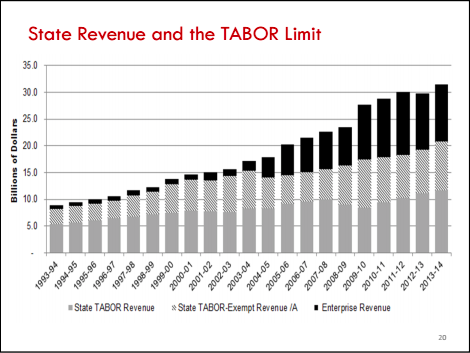Signing of the Americans with Disabilities Act in 1990 by then President George Herbert Walker Bush.
services & Housing required under federal law [ADA & Olmstead] trump TABOR
|
The first thing we want to make clear is that there is no "blank check" when it comes to housing and services.
The State always has a defense of "reasonableness" under the Americans with Disabilities Act (ADA) and the 1999 US Supreme Court Olmstead decision. Additionally, there's the famous "Fundamental Alteration Defense" but the US Department of Justice in the 2010 Delaware findings letter found no fundamental alteration where one is just bring services and housing to scale, where housing and services are available just NOT sufficiently available to meet the need. But a State Taxpayer Bill of Rights which limits state revenue and in the minds of politicians limits revenue for ALL services including those required by FEDERAL LAW. That's NOT right. But we've really experienced our share of State-sponsored Might Makes Right with a Smile on Its Face Of course, Gov. Hickenhooper and others seem to have their hands full with a Hospital Provider fee. So we appreciate the fact that the political will is running pretty low. Hopefully the Governor's two initiatives: 1. An Olmstead Compliance Working Group, and 2. A Comprehensive Behavioral Health Care Plan will help. But for sometime we have been talking about "Social Impact Bonds" and asking for a response from the State -- but never got an official response. We thought they might even need some statutory authorization, but that's not the case because they have stepped into the "social impact bond" arena for youth. The State needs to consider using Social Impact Bonds to address some of its many Olmstead compliance problems or something really crazy -- complying with the law and recognizing that TABOR is NOT a barrier to complying with Olmstead. |
|
WE'VE SAID IT BEFORE & WE'LL SAY IT AGAIN: OLMSTEAD & THE ADA TRUMP TABOR
|
Val's Take
I hate to always be playing the role of the super-critical gadfly -- who is pointing out flaws & short-comings & seems to have no sense of positivity whatsoever. We do think the Legislative Oversight Committee's Bill on Re-Entry Services for People with Mental Illness in Jails & Prisons -- to provide $2.7 Million in Housing & Supportive Housing is Fantastic!!!! Of course, Colorado is still NOT complying with the Americans with Disabilities Act & Olmstead [1999 US Supreme Court Case holding that unnecessary institutionalization of people with disabilities amounts to discrimination under Title II of the ADA]. Further, one of the defenses the US Supreme Court provided for States was a "comprehensive, effectively working" Olmstead plan -- of course, Colorado doesn't have one of those -- it did make a good faith effort. Unfortunately, after that some efforts were NOT good faith -- like is the State ever going to respond to our request for a waitlist for Assertive Community Treatment? But even the CO Dept. of Human Services thought we were acting out of turn --- Hmmm . . . -- well, Colorado is still NOT in compliance. Why we SO NEED Statutorily Authorized On-Going Olmstead Planning. Which interestingly brings me to Civil Commitment word-smithing. The reality is everything is connected AND it's just how much time & energy one has to bring it together. Additionally, one does have to bring some "insight" into the process as to what to include and what to leave out. I actually do believe we need to be making reasonable plans to bring to scale to meet the need for "beds" in the civil commitment process, etc. But that is an interactive process --- and it cannot be undertaken without asking what are reasonable plans to bring to scale to meet the need in the community for housing, services, etc. There are NO BLANK CHECKS. BUT YOU CAN'T CLAIM POVERTY:
It's so hard to comment on this without noting the State's lack>>
of good faith over the past two years and various documented lapses in integrity whether it's:
AND yet the State is trying to do a lot of great things. THE BOTTOM LINE: EVEN WITH THE STATE'S REAL & TRUE ATTEMPTS, SOME MORE INCLUSIVE THAN OTHERS -- THE NEXT 2 YEARS NEED TO BE A LOT BETTER THAN THE LAST 2 YEARS. |

New York Times
We Need Better Funding for Mental Health Services Fred Osher is the director of Health Systems and Services Policy at the Council of State Governments Justice Center. UPDATED MAY 9, 2016 The answer is not simply to build more psychiatric facilities, but rather to fulfill the promise of deinstitutionalization by providing effective treatment and supports in the least restrictive setting. Unfortunately, many people do not have access to proven interventions. Too many people have no health insurance; there have been too many budget cuts to treatment dollars, and there are too few providers available to deliver care. These obstacles should lead to a call to action, not a call to further confine people with mental illness. The movement to deinstitutionalize people with mental illness that began in the 1960s shifted the majority of fiscal responsibility from the states to the federal government. But the Community Mental Health Act of 1963, signed into law by President Kennedy, was never adequately funded. Resources that once paid for food, clothing, housing and rehabilitation, in addition to psychiatric treatment, didn’t follow the people into the community. The answer is not simply to build more psychiatric facilities, but rather to fulfill the promise of de-institutionalization by providing effective treatment. Then, in 1981, President Reagan signed the Omnibus Budget Reconciliation Act, which established block grants for the states to provide mental health care, but further cut federal spending by 30 percent. It only worsened the situation. Finally, in the aftermath of the 2008 recession, states were forced to cut over $4 billion in public mental health funding. With funding in free-fall, jails, prisons and nursing homes became the de facto places to warehouse people with serious mental illnesses. The number of people with serious mental illnesses who are incarcerated or homeless is three to five times higher than in the general population. There is a wide range of empirical evidence that shows, with appropriate treatment and community supports, people can recover, achieve their goals, and contribute to our society. For homeless individuals with mental illnesses, a place to stay with added support services can enable them to thrive. Supported employment is a method of getting people competitive jobs despite their disabilities. Medications, including those that can halt the devastating effects of addiction, allow people to resume their roles as students, parents and employees. Assertive community treatment models [State, do you see this?] meet people where they live and assist in connecting them to needed services. The challenges are great, but the willingness to address them is growing. Last month, Stepping Up, an initiative to reduce the number of people with mental illnesses in jails, held a national summit in Washington, D.C. where teams of law enforcement, court, corrections, and mental health professionals and county leaders gathered to develop comprehensive plans to address the issue in their jails. People with mental illnesses have unique needs, and their overrepresentation in jail, prison and other ill-equipped settings is a national tragedy. The toll it takes on them, their families, and our nation’s commitment to fair treatment for all is immeasurable. http://www.nytimes.com/roomfordebate/2016/05/09/getting-the-mentally-ill-out-of-jail-and-off-the-streets/we-need-better-funding-for-mental-health-services |
[We shouldn't be laughing, this is actually how we sometimes look -- although shorter with longer hair]
|


